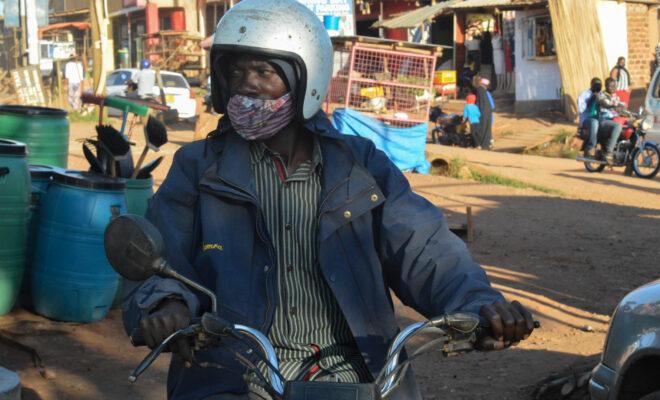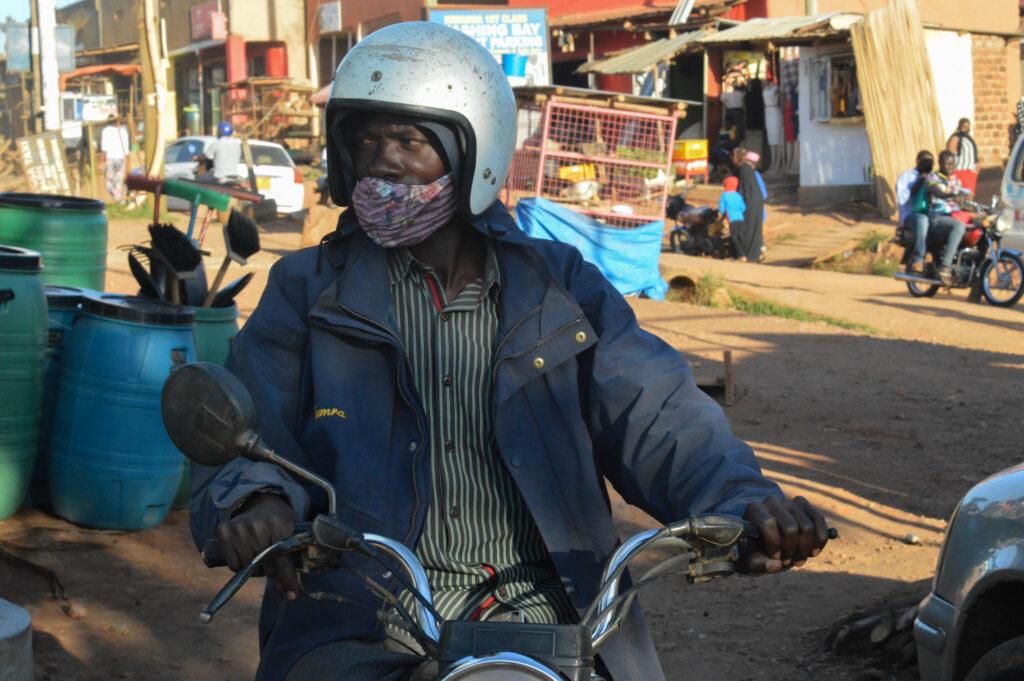How Uganda’s Covid aid missed the poorest but reached others

Vulnerable people impacted by a national lockdown were supposed to receive relief payments. Many saw nothing.

Nassur Sebakali, a boda boda driver, waits for customers in Kiwanga village in late August. The national lockdown severely impacted his business and made it difficult to support his family. Credit: Beatrice Lamwaka/Global Press Journal.
This story was originally published by Global Press Journal.
Nassur Sebakali sits for hours on his taxi stage in Kiwanga village, waiting for customers. The village is small, with a population of around 9,400 people. But the central marketplace is normally bustling with travellers arriving by taxi from Kampala, Uganda’s capital, about 16 km away. On a typical day, Sebakali would be busy shuttling people and their luggage to their homes aboard his boda boda motorcycle taxi.
On 18 June, in response to the coronavirus pandemic, the government announced a 42-day national lockdown, during which schools and shopping malls were closed and public and private transportation was prohibited, except in limited circumstances. Suddenly, Sebakali saw his business dwindle to almost nothing.
Many Ugandans found themselves facing similar hardship. To address the situation, the government said it would give USh100,000 ($28) in financial assistance to around 500,000 vulnerable Ugandans affected by the lockdown, including boda boda drivers. But many Ugandans who should have qualified for relief money say they never received the funds, and experts have criticised the relief programme as inadequate and marred by corruption.
“I am a registered Ugandan with a national identity number, and I need the money,” Sebakali says. “But I haven’t received it.”
The relief programme was developed by the government’s COVID-19 task force – a coalition of regional and local officials working with the prime minister’s office – which identified categories of individuals eligible to receive the payouts. Those included bar, gym and restaurant workers, DJs, teachers who were not already on the government’s payroll, cobblers and shoe shiners, bus and taxi drivers, and street vendors.
Local council leaders were asked to create lists of these eligible individuals, and the national government would transfer the money to them via their mobile phones, which are connected to people’s national identity numbers.
The total of around 500,000 people deemed eligible for relief is small – 8.3 million Ugandans live in poverty, according to the Uganda Bureau of Statistics. The relief programme therefore was not designed to assist every vulnerable person in Uganda, but rather those whose incomes were directly affected by the lockdown measures, says Aggrey David Kibenge, permanent secretary at the Ministry of Gender, Labour and Social Development.
Even so, it has not gone smoothly. Out of the 100 taxi drivers at the Kiwanga taxi stage, only six received the promised financial relief, says Abdul Rashid Tamale, the taxi stage’s vice chairman.
“Many of the drivers have been left helpless to survive without work and support of the government they pay tax to,” Tamale says.
Part of the problem is that the government doesn’t have good statistics about who should be eligible for relief, says Cissy Kagaba, executive director of the Anti-Corruption Coalition Uganda. “Instead, the government is relying on local council leaders to identify the vulnerable,” she says, “which means they can place their friends and relatives on the list, even when they don’t meet the vulnerability criteria.”
Joyeux Mugisho, executive director of People for Peace and Defense of Rights, which promotes refugee rights, says many refugees also were unable to benefit from the programme, despite meeting the eligibility criteria, because they lacked mobile phones and official documentation. Mugisho couldn’t provide data on how many refugees may have been impacted.
“While we recognise the effort the government has put in to fight the virus, refugees have been forgotten yet again,” Mugisho says. “No one has reached out to us during the 42-day extended lockdown. Refugees need to be planned for as well, even in the hard times.”
Kibenge says the programme relied on the honesty of local authorities. “Only persons given to us by the town clerk were paid,” says the ministry official. “There was no corruption beyond the level of data entry.”
However, while many eligible Ugandans did not receive support, some individuals who did not meet the official criteria did receive a payout from the government.
Naboth, a businessman in Kampala, says he’s not a vulnerable individual but nonetheless received USh100,000 two days after a friend in the western city of Hoima, who knows members of the local council, called and asked for his national identity number.
Naboth requested that he be identified only by his first name in order to avoid retribution by the government. Officials from the local council in Hoima didn’t respond to interview requests.
He isn’t the only one. Martin, who also asked to be identified only by his first name, works for a bank in Fort Portal, a city near the western border of Uganda. He too received the relief money after a friend in the city of Masaka, southeast of Fort Portal, asked for his national identity number.
“I was shocked when I received the money,” he says, “because clearly I am still working at the bank, and my finances have never been affected by the pandemic.”
Martin says he shared his identity number reluctantly and didn’t believe the government would actually send him the money since he doesn’t qualify for the relief programme.
Fred Bamwine, head of the task force in charge of Masaka’s COVID-19 relief fund, referred interview requests to the town clerk, Emmanuel Gakyalo. Gakyalo says he was unaware of any individuals who erroneously received relief money.
“To my knowledge, all the people who got the money qualified to get the money,” he says.
Timothy Lusala Batuwa, who serves as the political opposition party’s minister of health, says parliament should have been involved in determining who qualified for the programme and that local officials should have been more transparent about who was signed up to receive aid.
“We have heard stories that some local council chairpersons included about five members of their household on those lists of people meant to get the relief money,” he says. “Lists should have been displayed at the village level so that they are scrutinised one by one.”
Beatrice Lamwaka, Edna Namara, and Nakisanze Segawa translated some interviews from Luganda. Global Press is an award-winning international news publication with more than 40 independent news bureaus across Africa, Asia and Latin America.




